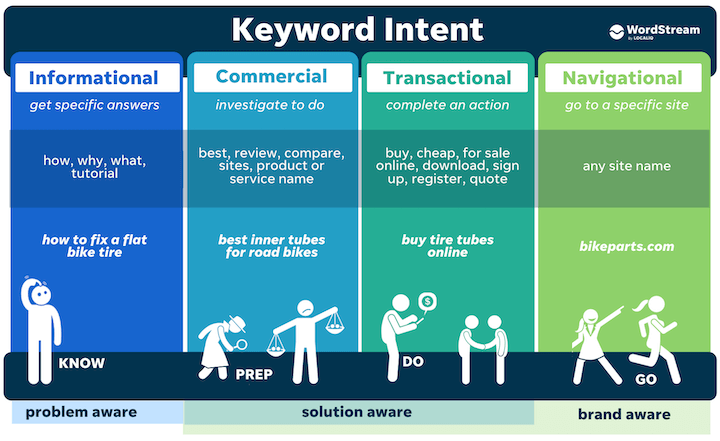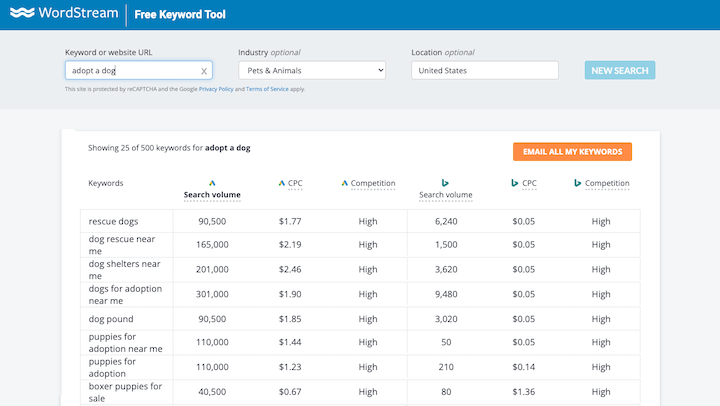Keyword Intent – The Secret to Attracting the Right Traffic
Keyword intent is one of the most important aspects of search engine marketing. Without a strong understanding of the intent behind visitors’ searches, even the most well-funded PPC campaign can fail. And poor understanding of keyword intent will hurt your SEO and content marketing efforts too. However, by leveraging keyword intent for intent-driven marketing, you can not only increase traffic to your site, but also attract more qualified prospects, driving more sales and generating more leads.
What is keyword intent?
Simply put, keyword intent is the intention we can infer from a user’s keyword. In other words, keyword intent tells us what the search engine user wants to know or find.
For example, if someone gets to your site after searching on the keyword “dentist near me,” we can guess a lot of information about that searcher. One, they need to a cleaning or other dental work. Two, they live in your area. That means this searcher is probably a good potential customer. This is what keyword intent is all about. By identifying keywords with strong intent, you’re in a good position to create marketing content and campaigns that will reach your best audience.
In the marketing world, we call keywords with a lot of marketing value “high-intent keywords.” Let’s look at this concept more closely next.
High Intent vs. Low Intent Keywords: What’s the Difference?
High intent keywords are also said to have high commercial intent. These keywords signify a strong intent on the part of the searcher to conduct a transaction, whether it be to buy something, inquire about a service, or another type of action that has a strong possibility of leading to a later sale.
There are four basic types of keyword or search query:
- Informational – searches performed to answer questions or learn something
- Commercial – searches performed to prepare for a transaction
- Transactional – searches performed to buy something
- Navigational – searches performed to locate a specific website

Commercial intent keywords are only relevant to transactional searches. If keywords can be considered “signals” from prospective customers, keywords with commercial intent are the most promising.
By contrast, low-intent keywords are those that can be considered either navigational or informational in nature. Someone looking for information on a given topic or searching for a specific website is unlikely to commit to a purchase as a result of these types of searches, meaning their commercial intent is considerably lower.
Examples of High Commercial Intent Keywords
Just as the desired actions that a visitor may take will vary widely from one business to another, definitions of high commercial intent keywords can also differ. However, there are two primary types of commercial intent keywords – “buy now” keywords and “product” keywords.
“Buy Now” Keywords
Examples of “buy now” keywords include:
- Buy
- Discount(s)
- Deal(s)
- Coupon(s)
- Free shipping
These keywords, while different, all serve the same purpose, which is to convince a prospect who has already decided to make a purchase to take action by offering additional incentives. “Buy” is the strongest of these keywords, as this indicates the strongest possible intent to purchase something on the part of the prospect, but the others also signify strong commercial intent.
“Product” Keywords
“Product” keywords also indicate prospects’ desire to commit to a purchase. Product keywords include:
- Branded searches (brand-name goods)
- Specific products (“iPhone 6” etc.)
- Product categories (“summer dresses”, “insect repellant”, “beach accessories” etc.)
- Affordable
- Best
- Cheapest
- Comparison
- Review
- Top
Some of these keywords will be more valuable than others, depending on the nature of the business. For example, branded and product-specific keywords are highly competitive, but convert very well. Although “comparison” and “review” keywords may not seem as strong as some of the others, these keywords can still convert highly as the intent to purchase is still there – the prospect might just make the advertiser work harder for the conversion.

Find relevant keywords with high commercial intent using WordStream’s Free Keyword Tool
When creating a list of product keywords, it is important to note the distinction between lead and product searches. This is crucial for service-based advertisers. For example, a prospect would not expect to “buy” a lawyer, but hire one. This means that although the prospect is considered a strong lead, the potential customer will likely need to call the business to discuss their situation further. For these reasons, “best” might be considered the strongest product keyword for a service-based businesses, as well as keywords such as “free consultation”.
Product searches, on the other hand, can be completed entirely online and focus solely on a specific product, so product keywords such as “affordable” and “cheapest” are likely to be the most effective (and most competitive).
The Advantages of Targeting High-Intent Keywords
Many advertisers mistakenly believe that exposure is more important than attracting qualified traffic. The notion of appearing to as many people as possible, rather than willingly narrowing ad campaigns to targeted, qualified visitors is tempting, particularly to new advertisers. However, this is a mistake.
Failing to consider the intent of searches means that the daily budget specified by the advertiser is likely to be exhausted much more quickly than it would be only targeting visitors who exhibit high commercial intent with their searches. Another drawback of the “quantity versus quality” approach to PPC is that if visitors performing informational or navigational searches click on ads without the intent of purchasing anything, the advertiser is still charged for those clicks, resulting in wasted spend on traffic that will never convert.
High commercial intent keywords, on the other hand, offer several advantages to advertisers. For one, the searcher is clearly indicating their intent to make a purchase by including high commercial intent keywords in their query.
Secondly, both Google AdWords and Bing Ads offer a variety of advertising formats that are ideally suited to high commercial intent keywords, such as Shopping Ads, which are highly attractive to searchers with commercial intent.
Keywords with strong commercial intent can also be significantly more cost effective, as click-through rates are strong, conversion rates tend to be higher, and advertisers utilizing them often have significantly reduced rates of wasted spend.
How to Identify High-Intent Keywords
One of the best ways to identify high commercial intent keywords is by using WordStream’s Free Keyword Tool. Try it today!
